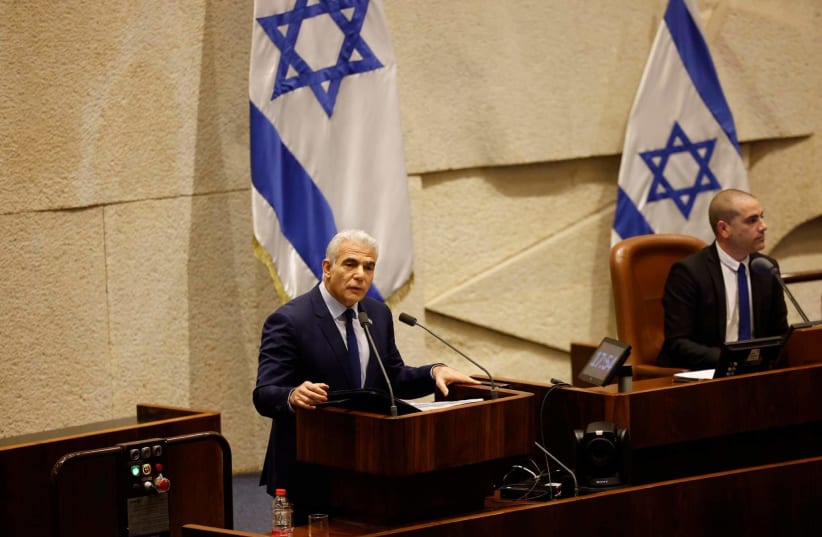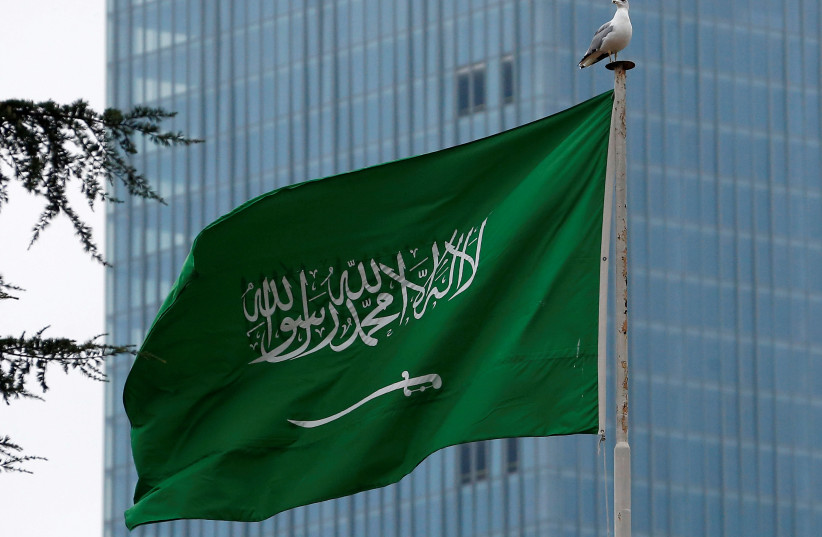Israel can normalize ties with Saudi Arabia in the near future, outgoing prime minister Yair Lapid told the Knesset as he urged his successor to follow on the groundwork his government had laid for such a deal.
“We started a dialogue with the Saudis to allow, in its first phase, for Israeli planes to fly over Saudi Arabia and to allow Israeli citizens direct flights to Mecca during the Hajj,” Lapid said, referring to the annual Islamic pilgrimage.
"We started a dialogue with the Saudis to allow, in its first phase, for Israeli plans to fly over Saudi Arabia and to allow Israeli citizens direct flights to Mecca during the Haj."
Outgoing Prime Minister Yair Lapid
“We did more than that. We laid down the foundations for Saudi Arabia to fully join the Abraham Accords,” he explained. “If the new government will follow the path we laid out, it is possible to normalize ties with the Saudis in the near future.”
Lapid was in the Prime Minister’s Office for only half a year, replacing Naftali Bennett, who had led their government since its inception in June 2021.
At the Knesset on Thursday prior to the swearing in of Benjamin Netanyahu’s government, Lapid summarized the activities of his joint government with Bennett, in which he had also held the post of foreign minister.
What has Netanyahu said?
Netanyahu has spoken of the possibility of an Israeli-Saudi deal, which would be in addition to the normalization agreements he finalized with four Arab countries in 2020 and 2021 under the auspices of the US-brokered Abraham Accords.
When he addressed the Knesset, Netanyahu spoke of wanting to finalize more normalization deals with countries in the region, explaining that he wanted to “widen the circle of peace” and “end the Israeli-Arab conflict.”
Lapid said his government had strengthened Israel’s ties with Abraham Accords countries, particularly the UAE, Bahrain and Morocco, where embassies had opened.
Together with the US, they joined with Israel’s more longstanding allies, Egypt and Jordan, in a new body called the Negev Forum.
Against all predictions, Lapid said, his government had been effective in working against Iran.
He credited his joint government with thwarting US President Joe Biden’s efforts to revive the 2015 Iranian nuclear deal.
“Contrary to all the rageful predictions and prophecies, our government managed to stop the signing of a revived nuclear agreement with Iran,” Lapid said.
This involved complex work with the Americans and the Europeans, which occurred under the radar, he explained.
“The result is known: the agreement was not signed, Iranian sanctions remained in force and were even extended.
“The Revolutionary Guards were not removed from the list of terrorist organizations, and the International Atomic Energy Agency did not close its investigatory files on Iran,” he added.
In addition, Lapid said, Israel signed the historic Jerusalem Declaration with the US, in which it was agreed that “Israel has a full right to defend itself and to act to prevent the Iranian nuclear program in any way Israel deems appropriate.
“The statement includes an American commitment to economic and security cooperation on an unprecedented scale,” Lapid said.
Within the region, he said, Israel worked to prevent Iranian military entrenchment in Syria.
Israel strengthened its relationship to the US while holding on to its principled positions, including the refusal to allow the Biden administration to reopen the consulate general in Jerusalem, which had served the Palestinians.
“We did not agree... to give the Americans any veto rights over Israeli actions and... we did not agree to international investigations of IDF soldiers and commanders.”
Israel, he said, strengthened its ties with Jordan, restored full diplomatic ties with Turkey and signed a historic maritime gas deal with Lebanon.
The government’s tenure was the quietest period the Gaza border has seen in 15 years, he said.
“We implemented a zero-tolerance policy towards the explosive balloons and [rockets] from the Strip,” he said.
In the West Bank, he said, the government launched Operation Break the Wave to root out terror cells, and in Jerusalem it maintained the status quo on the Temple Mount.
On the financial end, The Economist rated Israel as the fourth best economy of 2022, he said. But he touted his chief achievement as the passage of the Disabilities Law.
“We are handing over a state with a strong economy and a diplomatic status that is one of the best ever. Please do not ruin it, we will be back soon, Lapid said.”

